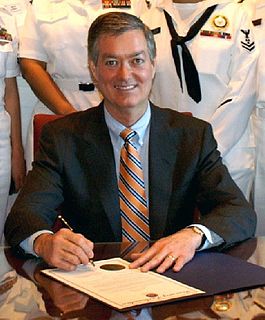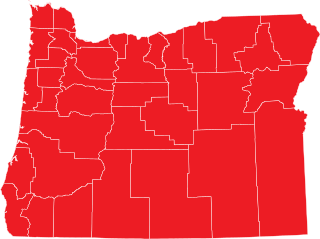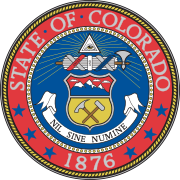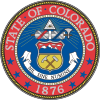
Proposition 13 was an amendment of the Constitution of California enacted during 1978, by means of the initiative process. The initiative was approved by California voters on June 6, 1978. It was upheld as constitutional by the United States Supreme Court in the case of Nordlinger v. Hahn, 505 U.S. 1 (1992). Proposition 13 is embodied in Article XIII A of the Constitution of the State of California.

William Forrester Owens is an American attorney, author, and former politician who served as the 40th Governor of Colorado from 1999 to 2007. Owens was re-elected in 2002 by the largest majority in Colorado history, after making transportation, education, and tax cuts the focus of his governorship. As of 2019, he is the last Republican to serve as Governor of Colorado.

In California, a ballot proposition can be a referendum or an initiative measure that is submitted to the electorate for a direct decision or direct vote. If passed, it can alter one or more of the articles of the Constitution of California, one or more of the 29 California Codes, or another law in the California Statutes by clarifying current or adding statute(s) or removing current statute(s).

Proposition 76 was a ballot proposition in the state of California in the referendum election. It involves school funding, state spending, and is an initiative constitutional amendment.

Amendment 41 is a citizen initiative adopted by Colorado voters in the 2006 general election. Amendment 41 has three main sections.

Oregon ballot measure 48 was one of two unsuccessful ballot measures sponsored by the Taxpayers Association of Oregon (TAO) on the November 7, 2006 general election ballot. Measure 48 was an initiated constitutional amendment ballot measure. Oregon statute currently limits state appropriations to 8% of projected personal income in Oregon. If Governor declares emergency, legislature may exceed current statutory appropriations limit by 60% vote of each house. This measure would have added a constitutional provision limiting any increase in state spending from one biennium to next biennium to the percentage increase in state population, plus inflation, over previous two years. Certain exceptions to limit, including spending of: federal, donated funds; proceeds from selling certain bonds, real property; money to fund emergency funds; money to fund tax, "kicker," other refunds were included in the provisions of the measure. It also would have provided that spending limit may be exceeded by amount approved by two-thirds of each house of legislature and approved by majority of voters voting in general election.

Douglas Edward Bruce is an American conservative activist, former legislator in the U.S. state of Colorado and convicted felon.
The Oregon tax rebate, commonly referred to as the kicker, is a rebate calculated for both individual and corporate taxpayers in the U.S. state of Oregon when a revenue surplus exists. The Oregon Constitution mandates that the rebate be issued when the calculated revenue for a given biennium exceeds the forecast revenue by at least two percent. The law was first passed by ballot measure in 1980, and was entered into the Oregon Constitution with the passage of Ballot Measure 86 in 2000.

Oregon Ballot Measure 59 was an initiated state statute ballot measure sponsored by Bill Sizemore that appeared on the November 4, 2008 general election ballot in Oregon, United States. If it had passed, Oregon would have join Alabama, Iowa, and Louisiana as the only states to allow federal income taxes to be fully deducted on state income tax returns.

Oregon ballot measure 41 was one of two unsuccessful ballot measures sponsored by the Taxpayers Association of Oregon (TAO) on the November 7, 2006 general election ballot. If passed it would have allowed a state income tax deduction equal to Federal exemptions deduction to substitute for state exemption credit on a persons state income tax filing.

A Massachusetts general election was held on November 8, 1994 in the Commonwealth of Massachusetts.

Massachusetts Question 3, filed under the name, the 3 percent Sales Tax Relief Act, appears on the November 2, 2010 ballot in the state of Massachusetts as an initiative. The measure, if enacted by voters, would reduce the state sales tax rate from 6.25 to 3 percent. The measure is being sponsored by the Alliance to Roll Back Taxes headed by Carla Howell. The measure would be enacted into a law 30 days after the election if approved by voters.

The California state elections was held on Election Day, November 6, 2012. On the ballot were eleven propositions, various parties' nominees for the United States presidency, the Class I Senator to the United States Senate, all of California's seats to the House of Representatives, all of the seats of the State Assembly, and all odd-numbered seats of the State Senate.
The Michigan Sales Tax Increase for Transportation Amendment, Proposal 15-1 is a referendum held on May 5, 2015, concerning a legislatively-referred ballot measure. The measure's approval would have caused one constitutional amendment and 10 statutes to go into effect. It is estimated that Proposal 1 would raise state revenues from sales and use taxes by $1.427 billion, fuel taxes by $463 million, truck registration fees by $50 million, and vehicle registration fees by $10.1 million in the first year. If approved, the proposal would have resulted in average tax increase of $545 per household in 2016, according to an estimate by the Associated Press.

The Massachusetts general election held on November 5, 2002, included three ballot measures that were voted on by the public.

California state elections in 2018 were held on Tuesday, November 6, 2018, with the primary elections being held on June 5, 2018. Voters elected one member to the United States Senate, 53 members to the United States House of Representatives, all eight state constitutional offices, all four members to the Board of Equalization, 20 members to the California State Senate, and all 80 members to the California State Assembly, among other elected offices.

California Proposition 69 was a legislatively referred constitutional amendment that appeared on ballots in California in the June primary election in 2018. This measure put the revenue from the Road Repair and Accountability Act, which increased fuel taxes, in a "lockbox" so that it can only be used for transportation-related purposes. It also exempts said gas tax revenue from the previously existing appropriations mandate and expenditures limit. This state constitution amendment ensures that revenues from SB1 Gas Taxes established by the Road Repair and Accountability Act of 2017 can only be used for transportation-related purposes.







